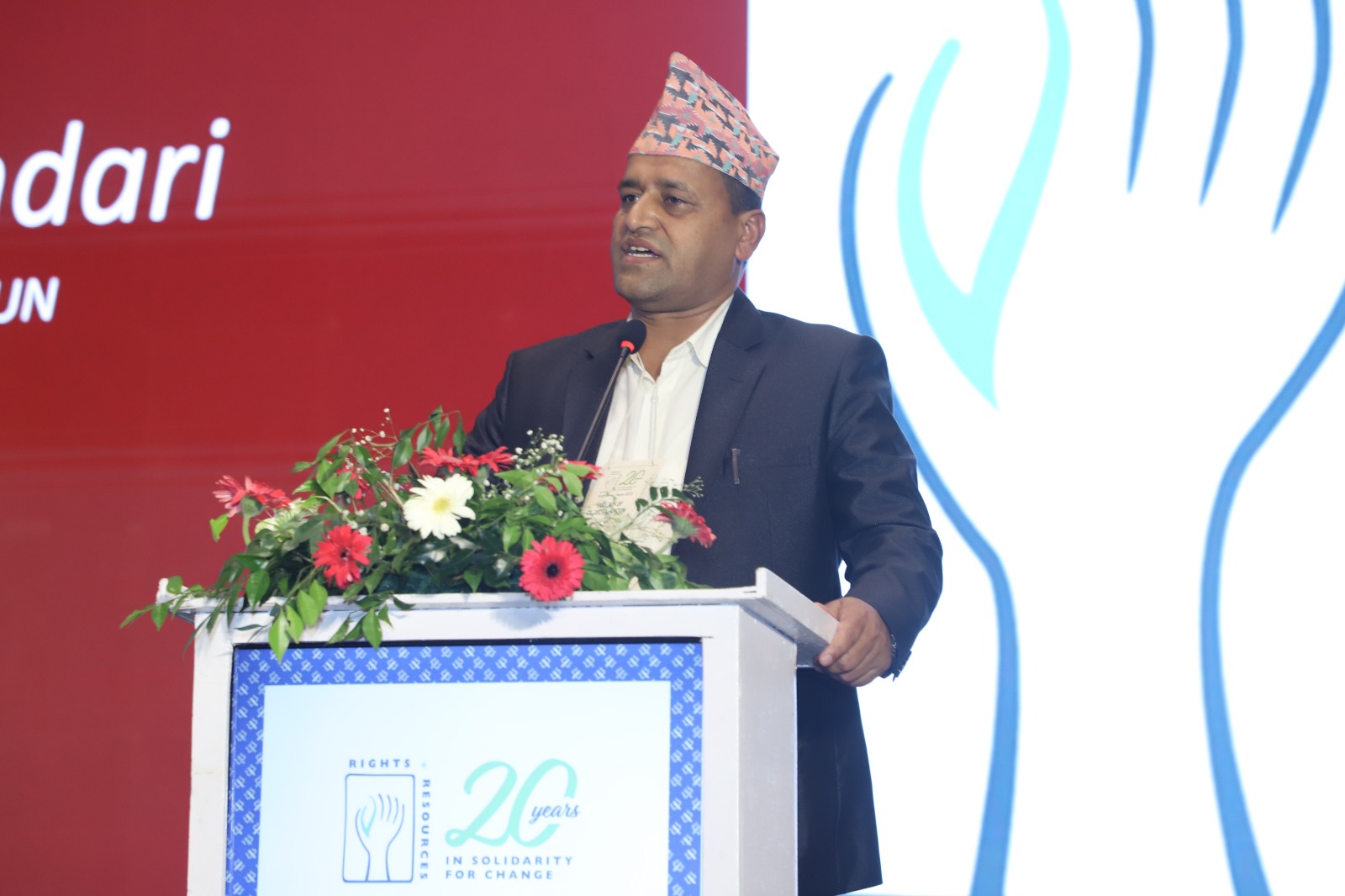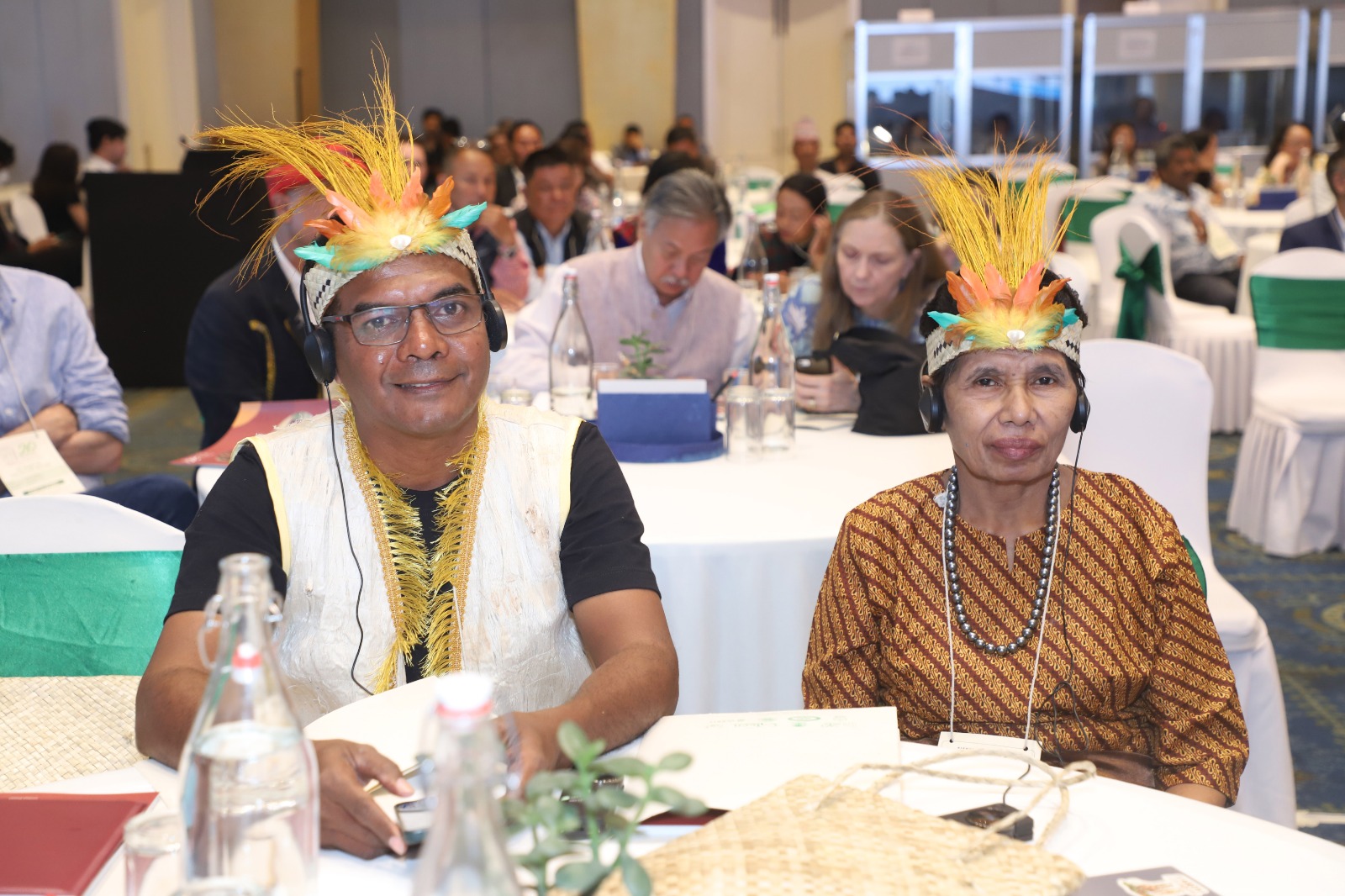National
International representatives convene in Kathmandu to discuss resource rights of indigenous people
Indigenous leaders from Asia, Africa and Latin America honored for their contributions.
Post Report
Around 200 national as well as international participants have gathered in Kathmandu to discuss the issues related to land, forest and other resources in an international event inaugurated in the capital on Monday.
The Rights and Resource Initiative (RRI), a global coalition of over 200 organisations working to advance the land and resource rights and development of indigenous peoples, local communities, and Afro-descendant peoples, convened its 20th anniversary in Kathmandu.
Aain Bahadur Shahi Thakuri, Nepal’s minister for forests and environment, inaugurated the four-day event on Monday, which is underway at Yak and Yeti Hotel in Kathmandu.
He expressed special gratitude for selecting Nepal for this celebration. “RRI is playing an important role in promoting sustainable forest resource management, community forestry and environmental conservation in Nepal,” Thakuri said. “Nepal’s community forest development, conservation, and mitigating the impacts of climate change are all targets of this collaboration, and the Ministry of Forests and Environment will extend all its support in this area.”
Prime Minister KP Sharma Oli, who is currently in Spain, sent a written message to the event.
“Since 2007, the RRI coalition has worked closely with Nepal’s community forestry movement, one of the most inclusive and successful forest governance models in the world,” the prime minister said. “Thanks to the dedication and stewardship of our local communities, Nepal has significantly expanded its forest cover from 29 percent to over 46 percent, an achievement that speaks volumes about community ownership and grassroots conservation.”
The event was hosted in partnership with long-standing Nepal-based RRI members including the Federation of Community Forestry Users Nepal (FECOFUN); Nepal Federation of Indigenous Nationalities (NEFIN); Green Foundation; CIPRED; National Indigenous Women's Federation (NIWF); Indigenous Women Legal Awareness Group (INWOLAG); and Women Rights and Resources Network.

During the anniversary, the RRI also announced the winners of its inaugural Collective Action Awards, which honours Indigenous Peoples, Afro-descendant Peoples, and local communities for their leadership in defending their collective land, forest, and resource rights.
“RRI selected three winners from nearly 200 nominations,” the organisers said in a press release.
The RRI Collective Action Awards recognise under-recognised communities across the Global South whose work exemplifies sustainable livelihoods, climate action, and cultural resilience, the organisers said.
Among the three winners Nashulai Maasai Conservancy in the Maasai Mara Ecosystem in Kenya is from Africa, which was honoured for launching one of East Africa’s first Indigenous-owned and run conservancies in 2016.
The Jargaria Indigenous Community of the Aru Islands in Maluku Province, Indonesia was selected from Asia for its powerful grassroots environmental defense, particularly through the #SaveAru movement, according to the organisers.
Likewise, Jupago Kreká Indigenous Collective from the Xukuru do Ororubá Indigenous People in Brazil was honoured from Latin America for regeneration of their Sacred Territory in Brazil, which had been degraded since colonization.
“These awardees are living proof that solutions to the global climate and biodiversity crises are already here,” said Dr Solange Bandiaky-Badji, RRI president and coordinator. “Rooted in ancestral knowledge and powered by collective action, their work offers a roadmap for the rest of the world. It is our deepest honor to recognise them today and help amplify their voices globally.”

Peggy Smith, chair of RRI’s board of directors, said that the courage, wisdom, and innovation of these communities—along with the 15 other inspiring finalists—reminded that true leadership is found in collective stewardship.
The 15 Collective Action Award Finalists include Mt. Elgong Ogiek (Kenya); Community of Massaha (Gabon); Bashi Community of South Kivu (DRC); APAC Kollou Ndig (Senegal); Batéké-Nord Community (DRC) from Africa.
Tsumba Community (Nepal); Lumad Community (Philippines); AMAN Bima Region (Indonesia); Indigenous Peoples of Adat Dalem (Indonesia); and Tiriya Gram Sabha (India) are from Asia.
Comunidad Achuar Sharamentsa (Ecuador); Potato Park (Peru); Pucayacu (Peru); Community Council of Afro-descendant Women of California Delpatia (Colombia); and Junta de Acción Comunal Vereda San Isidro (Colombia) are from Latin America.
According to Thakur Bhandari, chairperson of FECOFUN, the RRI and FECOFUN have consistently collaborated to support community forestry in Nepal since 2007.




 14.24°C Kathmandu
14.24°C Kathmandu














